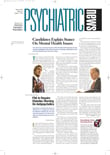An article in the July 18 issue summarized some of the putative controversy regarding the gender identity disorder (GID) diagnosis, including its use with children, as discussed at the APA annual meeting in San Francisco. Dr. Hill’s critique of GID is replete with inaccuracies.
He asserts that “gender roles are not clearly dichotomous, like DSM suggests they are.” Almost no behavior is completely dichotomous between two groups, but the phenomenology of the GID criteria is based, in part, on very strong mean differences between the behavior of boys and girls that play a strong role in how one’s gender is subjectively constructed. Hill’s disavowal of such differences reflects a lack of awareness of a large empirical research literature on children’s gender development.
His claim that there are no validity studies on GID in children is incorrect. Our group at the Child and Adolescent Gender Identity Clinic at the Centre for Addiction and Mental Health in Toronto has conducted several diagnostic studies of children with GID, with siblings, clinical controls, and nonreferred controls serving as comparison groups. All of these studies demonstrated substantial evidence for discriminant validity.
Hill also stated that “[t]here is little evidence of pathology.” By this, he is referring to the presence of other behavioral/emotional problems in children with GID. Hill is wrong. Using a well-standardized parent-report measure of child and adolescent behavior problems, the Child Behavior Checklist, we have published several studies showing that both children and adolescents with GID have, on average, as many general behavioral and emotional problems as demographically matched clinical control children and significantly more problems than nonreferred children.
Hill’s primary beef, however, is that he does not really accept the possibility that children can experience marked discomfort with their gender (gender dysphoria), other than seeing it as secondary to the reaction of others. In my view, this is a simplified understanding of the complexity of gender development. Consider, for example, a 3-year-old girl who repeatedly states that she is a boy or that she wants to be a boy. Her parents reply by telling her that she is a girl, and the child’s reaction is to cry and insist otherwise. Hill’s interpretation of such distress is that it is merely the result of the parents’ reaction, not the possibility that the child is also struggling with a complex feeling state. Of course, if the parents went along with the child’s fantasy that she was a boy, there would be no overt distress, but it would hardly solve the underlying problem and would merely reinforce it.
When GID in children persists into adolescence, often the only way the adolescent can feel comfortable about himself or herself is to go through the difficult process of contra-sex hormonal treatment and physical sex-change procedures. Hill’s characterization of GID as a “phantom disorder” seems remarkably naive.
